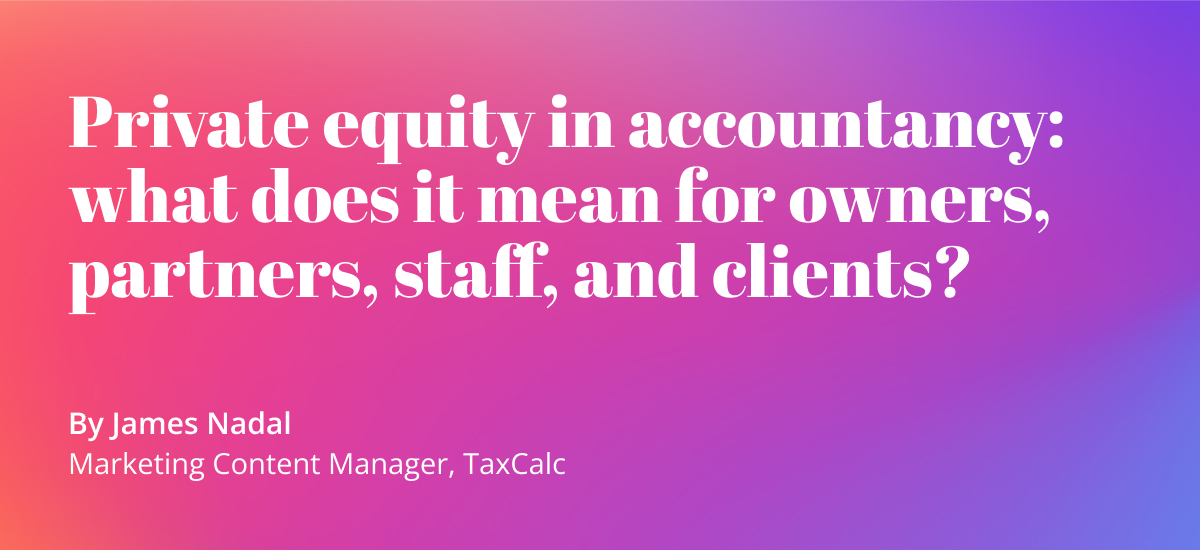TaxCalc Blog
News and events from TaxCalc
Private equity in accountancy: what does it mean for owners, partners, staff, and clients?

There’s been an explosion in Private Equity (PE) firms investing in accountancy practices over the last two years.
And interest appears to remain high, judging by reports in the media, and industry research.
According to a paper by Accountancy Europe, PE activity in the accountancy sector across Europe surged from 10 to 20 deals a year pre-2022 to about 200 in 2024. And the country leading the way? the UK – with 40% of the deals within that total being British firms.
Indeed, a recent TaxCalc survey suggested 62% of firms had been approached by PE investors.
Some 57% ranked it as a top three trend impacting the profession in a ICAEW survey last year. This also found 12% of firms had secured PE investment, while another 12% said they’d like to secure PE investment within three years.
So, with the chances of attracting PE investment rising, what do accountants mulling their options need to know about how it’s likely to change their firm?
What does it mean for owner/managers and the Partners? What is the likely impact for clients and fees?
Two experts on the subject - Nila Khan, Executive Director, Accelerate Community, and Alan Deichler, Past President & CEO, CPAmerica - were on hand at a TaxCalc webinar to give their insights.
Prepare for changes and stricter targets
Within a three-to-five-year period, PE firms are looking to multiply the level of fees they’ve acquired and will probably look to ‘flip’ or sell the accountancy practice to a new investor, Nila explained.
“In order to do that, there have to be changes in the firms,” she said.
“Perhaps that means more stringent targets. Perhaps that means increased charge at rates. Perhaps that means a very clear strategy on how these growth targets are going to be achieved.”
Expect ‘significant’ shifts in Partners’ jobs
For senior leaders at the accountancy practice, what will change?
“What that means for the incumbent partners is that a lot of their time becomes involved in integrating the firm and in change management,” Nila said. “So, their job or the owner manager's job is likely to change quite significantly once they go into one of these models.”
She added: “I think the reality is that a certain section of the partnership does very well out of selling, and everybody else has to sort of wait and see and carve their own pathway.”
The pace of change
And once PE has taken over, do changes happen very quickly?
“They (PE firms) are smart people. They don't want to go in and radically change the firm around, but they do want a return on their investment and to pay off and reward their investors,” Alan says.
PE firms want to maintain consistency – and that’s one reason why things won’t drastically shift immediately, added Alan.
Client fees to rise ‘above inflation’
Accountants considering the ramifications of a PE buy-out also need to consider the impact on client fees. So, what do the experts see happen in these situations?
“I think generally fees do go up,” Nila explained. “It’s not necessarily seen as a bad thing that fees go up, as a profession. We do have a habit of underselling our clients, and that's built in intimately to the way we run our practices. So, you could argue that actually, you're now getting the correct value for the work that you're doing.”
She said: “I think typically fees do go up above inflation. And what that means is the clients who aren't prepared to pay those fees just drop out. But then that again facilitates the growth model.”
The PE investment impact for working culture
And how about the culture. What can staff expect?
“If you're very vehement about being independent, if you're very committed to leaving a legacy firm and a culture that you've built, it would be tricky to retain that legacy and culture by selling to a PE-backed firm. It doesn't mean to say that you couldn't go on to harness a different or a better culture, but it will be different.”
PE investment – a force for good in accounting?
Are we seeing any examples so far in the UK where practices are prospering? And is it demonstrably a good thing for the profession?
Nila says it’s too early to say in the UK.
“We are waiting to see what happens. And we should be able to find out in the next two to three years whether there are success stories,” she said.
“However, if your objective is growth and if you're a partner or a partner group in a firm whose objective is to double in size, certainly this is a method to do that. So, if you were measuring success solely on growth, these people know what they're doing. They can achieve that growth. They can do it in a very structured way.”
Industry bodies sound caution as they inspect PE impact
The ICAEW has said it has seen a “slew of new PE-backed consolidator firms entering the market” from 2023.
However, 64% of respondents to the supervisory body’s survey said PE was “not attractive” to their firm, while 17% said they saw remaining independent as an opportunity.
The ICAEW has sounded a note of caution for accountants, saying that “accountancy practices considering private equity investment need to think about the regulatory implications and are encouraged to seek guidance from the Financial Reporting Council and ICAEW”.
Sarah Ghaffari, ICAEW’s Director Communities, Business and Practice, said: “It can be an attractive option for firms seeking to grow and offer a wider range of services or extended geographical coverage to their clients. However, as in any deal, it’s crucial to find an investor and structure that works for everyone, and that’s rarely straightforward.”
‘Important risks’ – watchdog’s message on audit
Richard Moriarty, Chief Executive Officer of the Financial Reporting Council, published an open letter about PE in September, warning “there are important risks that will need to be carefully managed” for accounting firms involved in audit.
Writing that PE investment and change of ownership in a firm has “the potential to affect its leadership and culture”, he said it “must be able to maintain and enhance over time the important public interest dimension of audit.”
Want to hear more about private equity in accountancy?






